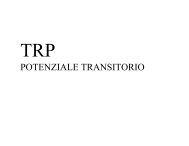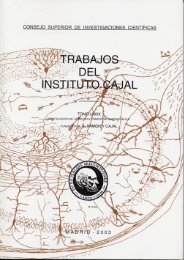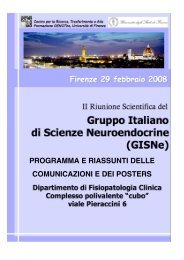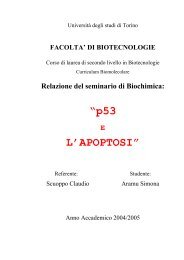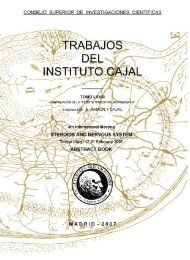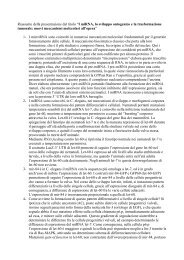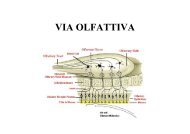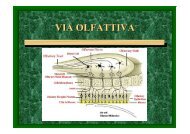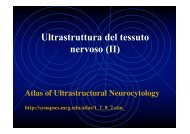GISNe - Anatomia, Farmacologia e Medicina Legale
GISNe - Anatomia, Farmacologia e Medicina Legale
GISNe - Anatomia, Farmacologia e Medicina Legale
Create successful ePaper yourself
Turn your PDF publications into a flip-book with our unique Google optimized e-Paper software.
SOMATOSTATIN ANALOGUES AND GHRH ANTAGONISTS INHIBIT ECTOPIC<br />
ENDOMETRIAL CELL PROLIFERATION AND SURVIVAL<br />
Marta Annunziata, Letizia Trovato, Fabio Settanni, Cristina Grande, Marco Camanni*, Francesco<br />
Deltetto*, Ezio Ghigo, Riccarda Granata.<br />
Molecular and Cellular Endocrinology Laboratory, Department of Internal Medicine, University of<br />
Turin. *Valdese Hospital, Turin.<br />
Endometriosis, the presence of endometrial cells outside the uterus, is a common estrogendipendent<br />
disorder that results in pelvic pain and infertility. Ectopic endometrium (outside the<br />
uterus) shows increased proliferation, impaired sensitivity to apoptosis, and different gene<br />
expression profiling with respect to eutopic endometrium (inside the uterus). Somatostatin (SS) and<br />
growth hormone-releasing hormone (GHRH) are hypothalamic hormones that respectively inhibit<br />
and stimulate pituitary GH secretion. In addition, in peripheral tissues somatostatin and its<br />
analogues inhibit while GHRH stimulates both normal and cancer cell growth and survival. These<br />
extra-pituitary effects are mediated by a family of five somatostatin receptor subtypes (SSTR1 to 5)<br />
and by the GHRH receptor (GHRH-R), particularly the splice variant 1 (SV1). Moreover GHRH<br />
antagonists act as antiproliferative molecules in normal and tumoral cells. Interestingly, both<br />
SSTR2 and GHRH expression have been shown in normal human endometrium.<br />
Aim of this study was to investigate the expression of GHRH, SS and their receptors in ectopic<br />
endometrium of patients with endometriosis. Moreover, to test whether SS analogues and GHRH<br />
antagonists would exert inhibitory effect on ectopic endometrial cell proliferation and survival. RT-<br />
PCR results showed SSTR2 and 5 mRNA and GHRH-R SV1 in ectopic endometrium (n=14).<br />
Further, by real- time PCR, we found that SSTR2 and SSTR5 were significantly more expressed in<br />
ectopic than in eutopic tissues. Importantly, the SS analogues Lantreotide and Octreotide dosedependently<br />
reduced ectopic endometrial stromal cell (ESC) growth and survival. Noteworthy, also<br />
GHRH antagonist JV-1-36 showed potent inhibitory effect on ESC proliferation and viability.<br />
In conclusion, these findings suggest that SS analogues, as well as GHRH antagonists may be<br />
useful molecules for preventing proliferation and survival of ectopic endometrial cells in patients<br />
with endometriosis.




